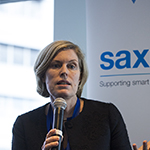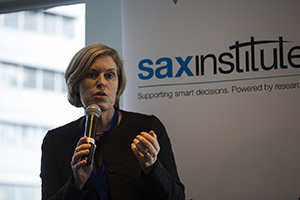
Health research needs to be purposeful, it needs to engage the end-user and it needs to be able to be scaled up if it is to have a real impact on policy and practice.

These were among the pointers offered by a panel of health leaders to early career researchers during the Sax Institute’s 2017 Research Action Awards, which recognise research that has had made a difference to policy, programs or service delivery – and to people’s health and wellbeing.
The panel comprised health leaders: Dr Teresa Anderson, Chief Executive, Sydney Local Health District; Dr Kerry Chant, Chief Health Officer and Deputy Secretary, Population and Public Health, NSW Health, and Ms Erica Kneipp, Assistant Secretary, Health and Medical Research, Australian Government Department of Health.
Author and broadcaster James O’Loghlin led the panel discussion, asking the members about the challenges they faced in making use of research, and what advice they would offer early career researchers to boost the likelihood of their research making a difference to policies or programs.
Tips from those in the know
The panel suggested a wide range of strategies that could help early career researchers undertake impactful research including:
- Ensure you have a good understanding of the Australian healthcare system, including how state and Commonwealth funding works
- Pick up the phone or knock on policy makers’ doors to discuss your research ideas −they are happy to hear from you and can help you to get the research question right before embarking on your project
- Find a mentor (eg. a senior researcher) to help you navigate the system
- Engage the end-user of the research
- Collaborate
- Develop partnerships and think multi-disciplinary
- Work in the field and let it inform your research
Dr Chant said policy makers often found it difficult to scale up or to implement research projects on the ground, because they were too expensive or didn’t fit with existing programs, services or funding models.
“If research is to be translatable, it is important researchers do get it right from the very beginning, including considering the practical issues,” she said. “I would much prefer early engagement by researchers.”
Dr Anderson agreed: “If you involve policy agencies right from the beginning, you can look at whether the research is actually going to work in a large, complex health system,” she said. “If the research is done together with policy agencies, it makes a big difference.”
Ms Kneipp urged researchers to be aware of the health landscape, including what was happening in health and medical research, to be purposeful, and to “collaborate, collaborate, collaborate”.
Find out more
- Read about our Research Action Award 2017 winners
- Read other Tips and Tools articles: Nine reasons why researchers should embrace Twitter





